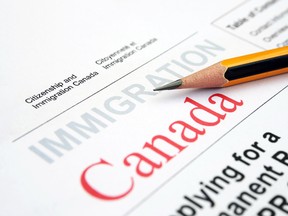Public support for newcomers is sinking, poll finds ahead of the release of government targets
Article content
Public support for the number of newcomers coming into Canada has declined for the second consecutive year, according to a new national survey, just as Justin Trudeau’s government gets set to announce its new immigration targets.
Almost six in 10 Canadians believe Canada accepts too many immigrants, the survey of roughly 2,000 people in September said, an increase of 14 percentage points from last year and 31 percentage points from 2022.
Advertisement 2
Article content
“For the first time in a quarter-century, a clear majority of Canadians say there is too much immigration,” said the report published on Thursday by research group Environics Institute and Toronto Metropolitan University’s Diversity Institute, with support from Century Initiative, a charity.
The change in attitude is the most rapid over a two-year period since 1977, when the group’s researchers started asking the question of whether there is “too much immigration” in Canada. It is also the largest proportion of Canadians since 1998 who said there is too much immigration.
The survey was released two weeks ahead of the release of the federal government’s annual Immigration Levels Plan, which estimates the number of permanent residents who will be admitted in the coming years. The current plan is to accept 500,000 newcomers in each of 2025 and 2026.
But Immigration Minister Marc Miller late last month said he was exploring the option of reducing that number due to declining job vacancies, rising unemployment — especially among newcomers and younger people — and growing concerns about affordability.
Article content
Advertisement 3
Article content
“There is certainly a world now in which we see reductions,” he said.
If the targets for permanent residents are reduced, it will be in line with some of the cuts Miller has made with respect to temporary residents in the past year.
In March, he announced a cap on temporary residents for the first time, with the goal of cutting down the number to five per cent of the overall population by 2026, from about 6.5 per cent currently.
Immigration plays a key role in the country’s economy, with newcomers accounting for more than one-third of the workforce in industries such as accommodation and food services, transportation and warehousing, and the professional, scientific and technical sectors, according to Statistics Canada. The country’s aging population is another reason why there’s a high reliance on immigrants.
About 68 per cent of the respondents in the Environics survey said immigration has a positive impact on the economy, but that is six and 15 percentage points lower than in 2023 and 2022, respectively.
Keith Neuman, a senior associate at Environics, said past survey results seemed to show that the public’s concerns linked to immigration were more about “who is being admitted, from where and how they were fitting in.” In the past two years, though, the focus seems to have shifted to the number of people coming in and how the system is being managed.
Advertisement 4
Article content
“It’s quite a significant shift over the past two years in (people’s) sense about the numbers and their confidence in the system, and the way in which immigration is being managed,” he said.
Neuman links the change to a number of factors, including how Canadians perceive the impacts of newcomers on economic concerns such as the housing shortage and the rising cost of living.
“I think, fairly or unfairly, many Canadians are looking at newcomers and saying, ‘Well, they are adding to a problem. Suddenly all these new people need a new place to live, and we are competing with them,’” he said. “(Immigration is) certainly not the primary cause of the housing crisis, but I think people are making the connection.”
Neuman said Canadians haven’t turned their backs on immigration the same way as some other countries where the sentiment is a lot more negative. In Canada, the concern is more about how the system is being managed.
As of July 1, 2024, the country’s population was estimated to be 41.2 million, according to Statistics Canada. It increased by about 1.2 million, or a rate of around three per cent, between July 1, 2023, and July 1, 2024, primarily due to immigration. The growth rate was similar in the past two years.
The growth rate seems to be slowing down, according to Statistics Canada.
Recommended from Editorial
-

Mark Miller looking into reducing immigration targets
-

Population growth continues despite signs of slowdown
Canada added 250,229 people between April and July this year, a quarterly growth rate of 0.6 per cent. That is lower than the 334,606 and 253,510 people added during the same quarters in 2023 and 2022.
• Email: nkarim@postmedia.com
Bookmark our website and support our journalism: Don’t miss the business news you need to know — add financialpost.com to your bookmarks and sign up for our newsletters here.
Article content
Support declines as Canada looks to set immigration targets
2024-10-18 16:01:25





